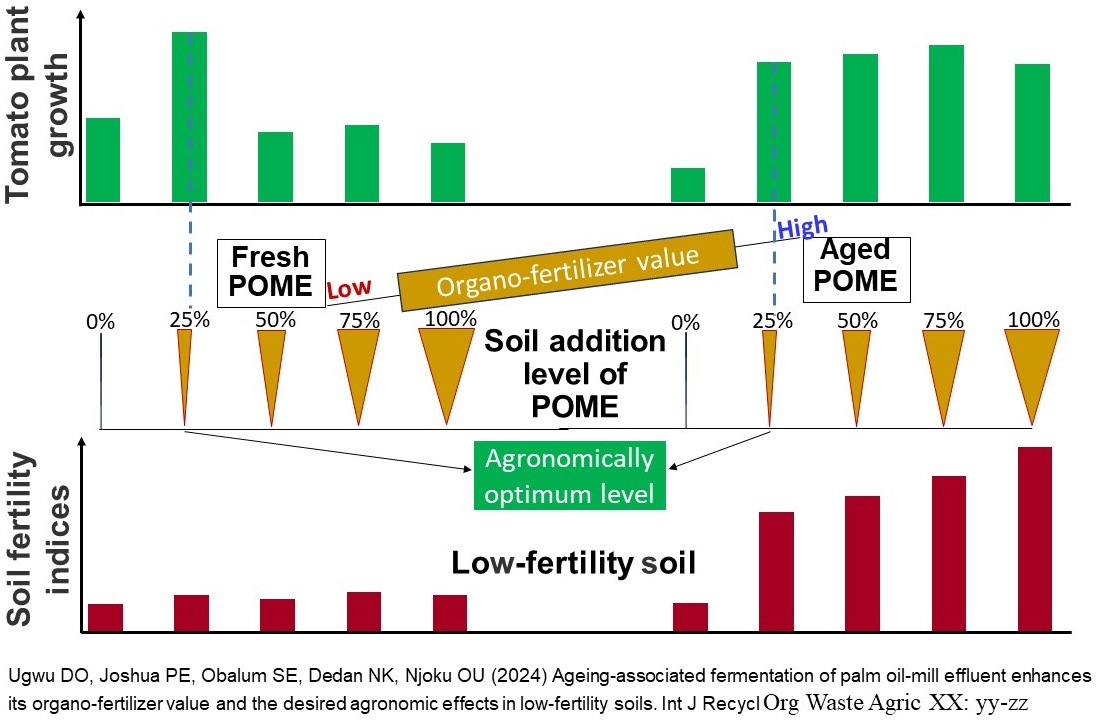Aging-associated fermentation of palm oil-mill effluent enhances its organo-fertilizer value and the desired agronomic effects in low-fertility soils
- Department of Biochemistry, University of Nigeria, Nsukka, Nigeria
- Department of Soil Science, University of Nigeria, Nsukka, Nigeria
- Department of Soil Science, Federal University of Kashere, PMB 0182 Gombe, Gombe State, Nigeria

Received: 2023-06-11
Revised: 2023-10-18
Accepted: 2023-02-28
Published in Issue 2024-04-06
Copyright (c) 2024 @Authors

This work is licensed under a Creative Commons Attribution 4.0 International License.
How to Cite
PDF views: 751
HTML views: 44
Abstract
Purpose: Fresh palm oil-mill effluent (POME) is toxic and when added to agricultural soils often inhibits plant growth. In this study, the prospects of temporal fermentation of POME with aging in enhancing its organo-fertilizer value before application to low-fertility soils were evaluated.
Method: Fresh and aged (6-12 months old) POME method were used to grow tomatoes at 0, 25, 50, 75 and 100% in potted soils from a fallow land. After 28 days, tomato growth attributes were used to index phytotoxicity, while soil physicochemical properties were determined.
Results: The fresh-aged POME ranges for pH, ash, organic matter, calcium, dissolved oxygen and biological oxygen demand were 7.00-8.45, 0.89-12.29%, 2.95-30.77%, 41.36-70.44 mg/l, 11.80-14.20 and 600-720 mg/l, respectively. Soil pH, organic matter, total N, available P and exchangeable bases increased due to POMEfresh and POMEaged, with optimal rates within 25-75% and 75-100%, respectively. Apparent cation exchange capacity was highest at 50% of POMEaged. Soil pH, total N and available P in ⥠25% POMEaged were rather high for tomato; so, optimal agronomic rate was 25%, beyond which POMEfresh and POMEaged caused control-like reductions and marginal increases in seedlings growth, respectively. Relative increases in both soil and crop parameters in the amended over the control were greater in POMEaged than POMEfresh treatments, and reflected increases in soil pH, P release and exchange of plant-nutrient cations.
Conclusion: Ageing-associated fermentation of POME could valorize it as organo-fertilizer for increased arable crop production in low-fertility soils. Controlled addition of aged and particularly fresh POME to these soils could avert inimical soil reactions, excessive nutrients mineralisation and/or growth inhibition, with the suggested agronomically optimal concentration being 25%.
Research Highlights
- Age-fermented palm oil-mill effluent (POME) shows enhanced organo-fertilizer value
- Temporal fermentation of POME valorizes it as liquid manure in low-fertility soils
- Relatively more aged POME is needed to boost soil fertility and nutrients release
- Soil addition of aged POME at ≤ 25% can sustainably increase tomato productivity
- Exceeding this rate for the more toxic, less effective fresh POME inhibits growth
Keywords
- Agronomic evaluation,
- Biological oxygen demand,
- Fresh palm oil-mill effluent,
- Liquid ma-nure,
- Soil macronutrients,
- Temporal fermentation

 10.57647/ijrowa-xqpd-6789
10.57647/ijrowa-xqpd-6789












